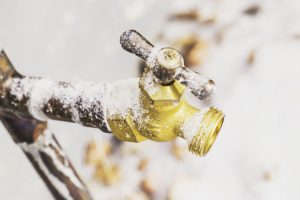 Preventing winter plumbing problems is possible, but does require special measures to ensure a smooth running system through the cold months. The frigid temperatures present a unique set of challenges to your pipes and other plumbing parts.
Preventing winter plumbing problems is possible, but does require special measures to ensure a smooth running system through the cold months. The frigid temperatures present a unique set of challenges to your pipes and other plumbing parts.
Understanding the plumbing issues that most commonly arise during the winter season can help you better prepare your home to guard against frozen pipes, water heater issues and other challenges.
Common Plumbing Problems in Winter
Be proactive with your plumbing system and schedule a winter checkup with a professional plumber. A sewer camera inspection and assessment of your pipes can help detect small issues before they evolve into major plumbing emergencies. The most common winter plumbing problems to look for include:
1. Frozen Pipes
Unprotected pipes can freeze when the weather gets cold enough. Use pipe insulation or a warming cable if you want to complete a DIY job. If you’re unfamiliar with your plumbing system, you may want to rely on a professional plumber to complete the job. Insulating your pipes can protect them against freezing during the winter months. If, however, your pipes do freeze, turn the water off immediately and call a plumber. A frozen pipe can burst and cause significant damage to your entire system.
2. Water Heater Failure
A cold shower becomes even more unbearable during the winter months. Standard water heaters have an average lifespan of 10-12 years. Routine annual maintenance can help the unit run smoothly during that time. If your water heater is advanced in age or hasn’t been serviced within the past 12 months, schedule a routine inspection to ensure the tank is working optimally and can last through the winter.
3. Clogged Drain
Winter months are filled with holiday cheer. From Thanksgiving through New Year, you’re bound to have guests, host holiday parties and cook more than normal. Every drain in your home – from the toilet to the garbage disposal – works overtime. Schedule preventative maintenance with an environmentally friendly drain cleaning service, like hydro jetting. Your pipes could have a better flow rate, and you’re less likely to need an emergency plumber due to clogged drains.
4. Septic Tank Leaks
The line that runs from your home to the septic tank can freeze in cold climates. If this happens, you’ll need a dependable emergency plumber. You’ll also want to avoid creating compact snow on top of the tank. So, no sledding, driving or parking where the tank sits. Have your tank pumped before winter hits, or, if you’ve recently had it cleaned, schedule a routine inspection.
5. Water Line Break
Older plumbing is more susceptible to water line leaks or breaks. The frigid temperatures can cause the lines to split or develop holes. A frozen pipe is the most common reason for a water line break, so have your plumbing inspected ahead of freezing temperatures. The plumber can catch a leaking water line and can make any necessary repairs before the problem worsens.
Don’t wait until you’re faced with a plumbing emergency before you deal with winter plumbing problems. Schedule preventative maintenance for your system and can you’ll more likely to have working pipes throughout the cold season.
